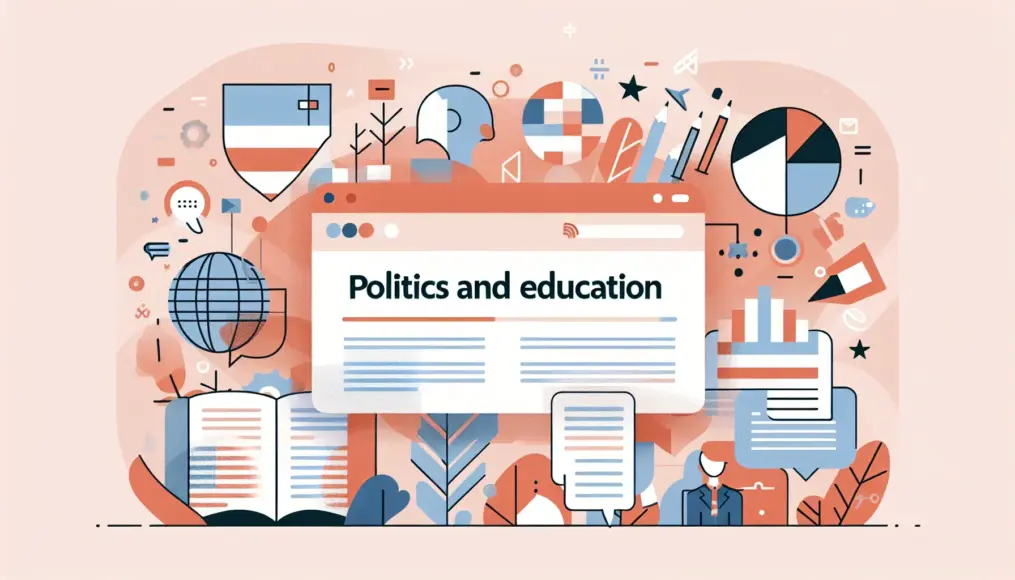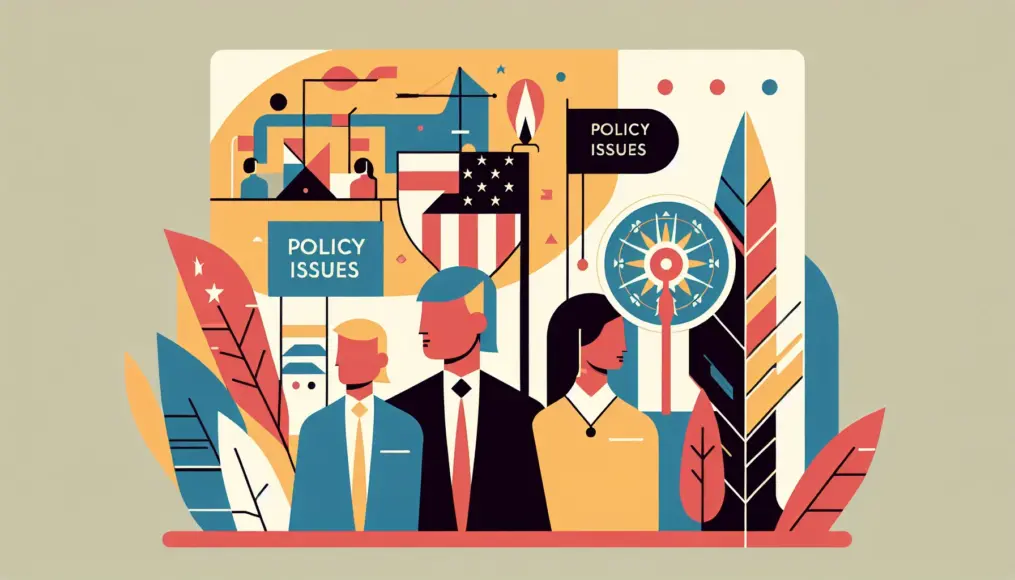The future of Japan lies in the hands of each and every one of us. Among the many elements shaping our society, politics and education stand out as particularly crucial. Understanding how these two forces intertwine and impact our lives is essential for building a better future.
In this article, we will delve into the relationship between politics and education, examining how we can actively participate in the political process and nurture civic awareness through education. To create a brighter future, it’s important to first develop our own opinions and cultivate the ability to express them.
- We’ll explore how politics and education influence society
- We’ll reflect on the evolution of politics and education in post-war Japan
- We’ll propose practical ways to encourage political participation among young people
Understanding the Basics of Politics and Education
Politics and education are two fundamental elements deeply embedded in our lives. Politics determines the rules and policies of society, while education provides the knowledge and skills necessary to understand and practice those rules. In this chapter, we will explore what politics is, as well as the role and importance of education. Gaining a solid understanding of these basics will help us consider how we should engage with society.
What is Politics?
Politics refers to the distribution of power and the decision-making processes within a society. In the communities where we live, laws, systems, and policies exist, all shaped by political activities. Politics isn’t just about government actions; it’s an essential aspect in which every citizen can participate. It’s crucial to recognize that our opinions and actions have the power to effect change in society through political engagement.
Moreover, politics has a direct impact on our lives. Various aspects, such as the education system, social welfare policies, and environmental issues, significantly influence our living standards and futures. Therefore, understanding politics is a civic responsibility and a vital first step toward creating a better future.
- Politics refers to the distribution of power and decision-making processes.
- Citizens have the power to influence society through political involvement.
- It’s important to understand how politics directly impacts our lives.
The Role and Importance of Education
Education is a crucial process that cultivates the knowledge and skills individuals need to thrive in society. Through education, we form our opinions and enhance our communication abilities. Additionally, education lays the foundation for individuals to understand their rights and responsibilities, encouraging active participation in politics.
Furthermore, education contributes to the overall development of society. Educated citizens possess better judgment and are able to think critically about social issues, playing an essential role in supporting democracy. Thus, education is not just about acquiring knowledge; it is a vital element for the healthy development of society as a whole.

If you found this article interesting, you might also like our piece on “What Kind of Education is Needed to Raise Future Sovereign Citizens?.” This article delves into the significance and practical examples of citizen education, offering valuable insights into how education can promote political participation among citizens.
- Education is a process that cultivates individual knowledge and skills.
- Through education, individuals can form their opinions and improve their communication skills.
- Education plays a crucial role in societal development and supports democracy.
The Interconnection of Politics and Education Throughout History
The relationship between politics and education has been deeply intertwined throughout history. This is particularly evident in post-war Japan, where political changes have significantly influenced the education system. Conversely, it is essential to explore how education has contributed to civic awareness and political participation. In this section, we will examine the evolution of politics and education in post-war Japan, along with the challenges that have arisen.
Political Changes in Post-War Japan
After World War II, Japan underwent substantial political transformations aimed at establishing democracy. A pivotal moment came with the implementation of the new constitution in 1947, which guaranteed national sovereignty and fundamental human rights, enhancing the transparency of governance. Against this political backdrop, the education system was also compelled to evolve. Education began to take on a role beyond mere knowledge transfer; it became vital in cultivating a sense of citizenship among the populace.
Moreover, the influence of politics on education is reflected in changes to policies and systems. For instance, revisions to the Fundamental Law of Education and the expansion of compulsory education illustrate the government’s commitment to prioritizing education. In this way, politics and education have supported societal development through their mutual influence.
- Post-war Japan experienced political changes aimed at establishing democracy.
- The new constitution guaranteed national sovereignty and fundamental human rights.
- The influence of politics on the education system is evident in policy changes.
The Evolution of the Education System and Its Challenges
The education system has evolved over time, but it has faced various challenges along the way. Post-war educational reforms shifted focus from rote memorization to emphasizing critical thinking and creativity. However, issues such as educational inequality, intense competition for entrance exams, and declining academic performance persist, many of which are influenced by political factors.
Furthermore, the cultivation of civic awareness through education is closely linked to political participation. Educated citizens are expected to understand their rights and responsibilities and to engage actively in the political sphere. However, until the challenges facing the education system are addressed, achieving genuine civic participation will remain difficult. Thus, the evolution of the education system and its challenges are significant themes in relation to politics.
- The education system has evolved over time but faces numerous challenges.
- Current educational issues are influenced by political factors.
- The cultivation of civic awareness through education is key to true political participation.
The Importance of Political Education in Modern Society
In today’s world, the significance of political education is on the rise. Cultivating civic awareness is crucial for maintaining a healthy democracy. Moreover, the political engagement of young people is key to shaping the future of our society. In this chapter, we will explore the current state of civic awareness and youth political participation, and how these elements are interconnected with political education.
Cultivating Civic Awareness
Cultivating civic awareness is at the heart of political education. Citizens need to understand their rights and responsibilities, and actively engage as members of society. Through education, we can raise awareness of political and social issues while fostering critical thinking skills. This process involves not just acquiring knowledge, but also developing the capacity to take action.
As civic awareness grows, so does interest in and willingness to participate in politics. This is an essential component for the healthy functioning of democracy, and the role of educational institutions and communities in this process is significant. Being aware of oneself as a citizen and actively voicing opinions is the first step toward building a better society.
- Civic awareness is central to political education
- Understanding one’s rights and responsibilities fosters engagement
- The role of educational institutions and communities is vital
The Current State of Youth Political Participation
Youth political participation is an incredibly important topic in modern democracy. In recent years, especially with the rise of social media, young people have more opportunities to express their opinions. However, actual voting behavior and involvement in policy-making processes are not always sufficient. Education is essential to deepen young people’s understanding of politics and to encourage them to form their own opinions.
Furthermore, when young people participate in politics, they have the power to create a better future for society. Education serves as a crucial foundation for this, and it is necessary to create an environment that encourages young people to take an interest in politics and to act on their beliefs. Political education is the key for young individuals to carve out their own futures.
- Youth political participation is vital in modern democracy
- Social media has increased opportunities for opinion expression
- Education lays the groundwork for encouraging youth political participation
Encouraging Political Participation as a Habit
Political participation shouldn’t be seen as a one-time action; it should become a regular part of our daily lives. Citizens are called upon to form their own opinions and engage actively in politics. In this article, we’ll explore ways to raise political awareness in everyday life and how community activities can foster a culture of political participation. These efforts are essential steps toward making our society better.
Raising Political Awareness in Daily Life
To elevate political awareness in our everyday lives, the first step is to become more sensitive to information. Actively seeking out news and understanding social issues is crucial. Additionally, sharing political opinions in conversations with friends and family provides an opportunity to clarify and organize our thoughts.
Moreover, it’s important to take an interest in the issues affecting your local community and to think about possible solutions. Participating in local events and discussions can deepen your understanding of specific problems and increase your motivation to engage politically. By consistently showing interest in politics, you lay the groundwork for making political participation a habit.
- Actively seek out information in daily life
- Share opinions through conversations with friends and family
- Take an interest in local issues and adopt a participatory attitude
The Connection Between Community Activities and Political Participation
Community engagement is a vital platform for encouraging political participation. By tackling local issues, residents can connect with one another and find collaborative solutions. This connection can elevate political awareness and serve as a catalyst for action.
Furthermore, volunteering and participating in local organizations can lead to direct political involvement. For example, attending events or campaigns related to local elections increases opportunities to voice political opinions. Thus, community activities not only foster a sense of civic responsibility but also serve as an important stage for realizing political participation.
- Community activities are a crucial platform for promoting political participation
- Connections among residents enhance political awareness
- Volunteering can lead to direct political involvement
Conclusion
In this article, we’ve delved into the intricate relationship between politics and education. Politics has a direct impact on our lives, while education plays a crucial role in enhancing our understanding of it. We explored the importance of fostering civic awareness and encouraging political participation among young people, alongside methods for raising political consciousness in our daily lives and the significance of engaging in community activities. These elements are essential for building a better society.
By each of us taking an interest in politics and actively participating, we can create a strong foundation that supports democracy. It is essential that we leverage the knowledge and awareness gained through education to take action for the future. Engaging in politics is also a way to shape your own future.
- Politics and education are closely intertwined
- Fostering civic awareness is crucial for a healthy democracy
- It’s important to raise political consciousness in our daily lives
Your voice has the power to change the future. So why not take that first step today? We’d love to hear your thoughts in the comments!



Comment